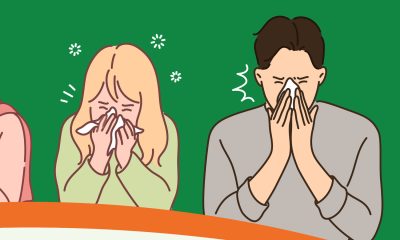By Gwyn Wright via SWNS
High cigarette taxes could save the lives of 231,000 children under the age of one worldwide every year, scientists have calculated
The first global analysis of its kind has found that to hit this figure every country should raise its cigarette taxes to 75 percent, levels recommended by the World Health Organization.
In addition, the research team led by Imperial College London academics say 182,000 newborns would have been saved if the right regulations had been in place.
Almost all of these young lives would have been saved in low and middle-income countries, according to the researchers.
These countries have the lowest levels of tobacco taxes and are where the biggest opportunities to improve child health exist.
The researchers suggest the taxes save lives because babies would be exposed to less smoke and fewer moms would smoke while pregnant.
The WHO says tax should represent 75 percent of the price of a packet of cigarettes, but in 2018 only 14 percent of the world’s people lived in countries where this was the case.
The researchers estimate that using taxes to push up the price of cigarettes by just 10 percent would save 78,000 under-ones and 64,000 newborn babies.
They found all types of taxation were associated with higher rates of child survival as people kick the habit because cigarettes have become too expensive.
The study’s co-lead author Dr. Anthony Laverty said: “We know that tobacco smoking continues to kill more than eight million people per year, and that increasing taxes on tobacco is an effective way to bring this number down.
“This study highlights that if everywhere taxed tobacco at the levels recommended by the WHO, we would substantially reduce neonatal and infant deaths.
“Tobacco use has significant and varied ill-effects on children’s health.
“When babies are exposed to smoking while in the womb, or exposed to second-hand smoke in the home after birth, this can increase the risk of health problems early on, like premature birth and asthma.
“Equally, tobacco can cause significant health problems for parents who smoke, affecting their ability to earn a living and their family’s wealth, which can indirectly affect a child’s health.
“Strong global tobacco control is vital to counter all of these causes, and to reduce the hundreds of thousands of needless child deaths we estimate are associated with smoking.”
The study’s senior author Dr. Filippos Filippidis said: “Raising tobacco taxes has been shown to be the most effective measure to reduce smoking, but most research is only in adults or high-income countries.
“Past studies from high-income countries have found that increasing tobacco taxes reduces preterm birth rates, asthma exacerbations and child deaths.
“Until now it was not clear if these findings can be applied to low- and middle-income countries where there is lower awareness of tobacco-related harm, and the influence of the tobacco industry is stronger and might suppress the positive effects of raising taxes.”
For the study, the researchers examined the link between cigarette taxes and infant mortality in 159 high, medium and low income countries using data from 2008 to 2018.
The study does not look at specific causes of death associated with tobacco.
The researchers also analyzed the results based on the type of taxes used – looking at them taken together as well specific types of taxes, such as cigarette taxes, value added taxes and import duties.
They note that their study did not look at overall prices of cigarettes, so it may overlook how tobacco companies often offset these taxes by lowering the cost of their products.
They accounted for a range of variables including gross domestic product, fertility rates, education levels and access to drinking water.
During that period, the average neonatal and infant mortality rates overall were estimated to be 14.4 and 24.9 deaths per 1,000 live births.
These rates were higher in low and middle income countries than high income countries – with 33 children aged under one (including 19 newborns) in every 1,000 dying each year in poorer countries compared to six under-ones (including four newborns) in every 1,000 in rich countries.
The average amount of tax on cigarettes was lower in poorer countries than richer ones- with tax making up just 43 per cent of the price of a packet in poorer countries compared with 64 percent in richer ones.
Fewer poorer countries met the WHO’s recommendation for 75 percent of the price to be tax.
Just 11 percent of poorer countries managed this compared with 42 percent of richer countries.
The study’s co-lead author Dr. Marta Rado said: “Ensuring that children grow up in a smoke-free environment should be a global health and human rights priority.”
The findings were published in the journal PLOS Global Public Health.

 Lifestyle1 week ago
Lifestyle1 week ago
 Wildlife4 days ago
Wildlife4 days ago
 Health5 days ago
Health5 days ago
 Good News5 days ago
Good News5 days ago
 Animals1 day ago
Animals1 day ago
 Entertainment2 days ago
Entertainment2 days ago
 Broadcast1 day ago
Broadcast1 day ago
 Travel5 days ago
Travel5 days ago




















